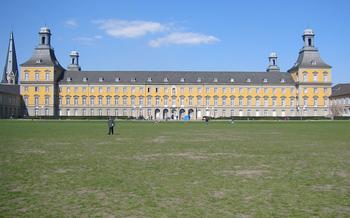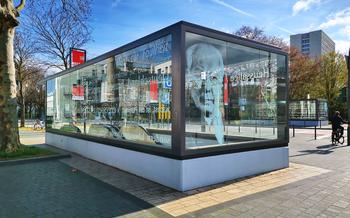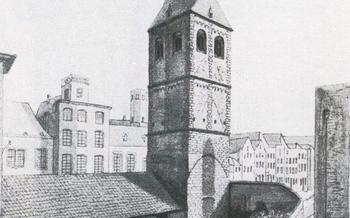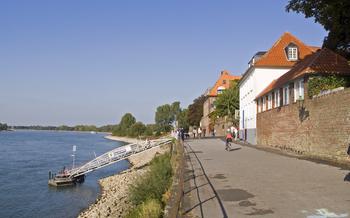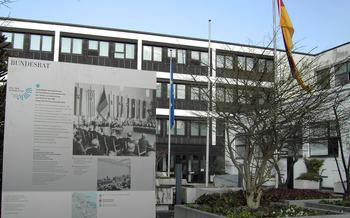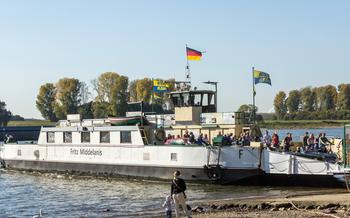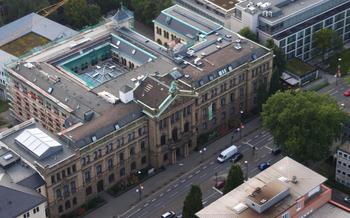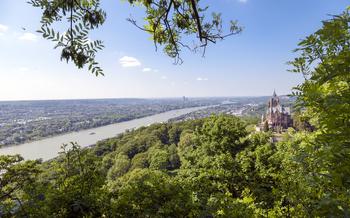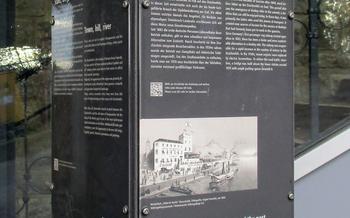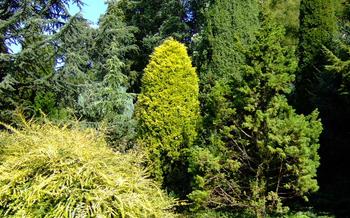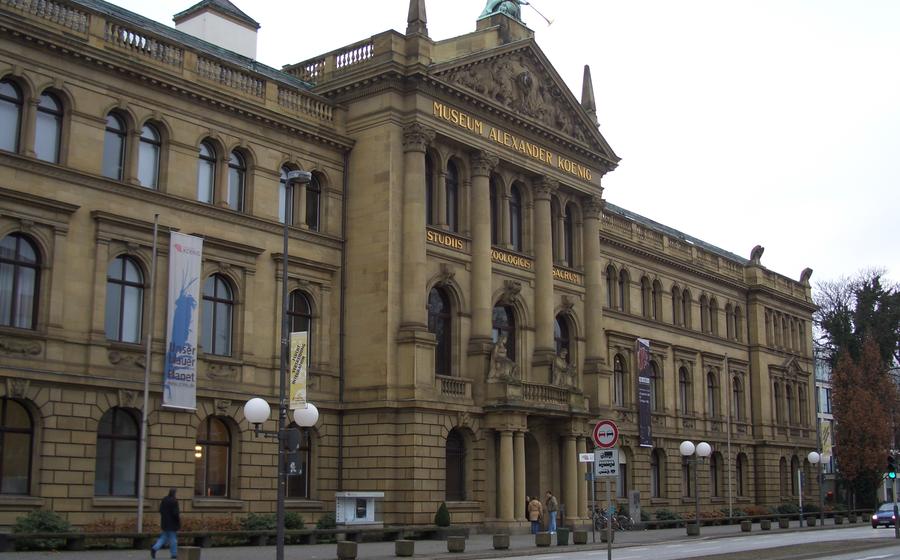
Zoological Research Museum Alexander Koenig
- Historical Background
- Exhibits and Displays
- Research Facilities
- Educational Programs
- Temporary Exhibitions
- Architecture and Design
- Interactive Exhibits: Engaging Visitors with Science and Technology
- Museum Tours
- Events and Workshops
- Accessibility and Facilities
- Ticketing and Admission
- Getting There
- Visiting Tips: Optimizing Your Museum Experience
- Nearby Attractions
- Insider Tip: Uncover the Secret of the "Talking Gorilla"
Historical Background
The Zoological Research Museum Alexander Koenig is a renowned institution dedicated to zoology and biodiversity studies. Founded in 1912 by Alexander Koenig, a prominent German zoologist, the museum has evolved into a leading research center and a popular destination for visitors interested in the natural world. Koenig's passion for zoology and his extensive collection of animal specimens laid the foundation for the museum's development. Over the years, the museum has expanded its collection, established research partnerships, and played a crucial role in promoting biodiversity conservation and scientific research. Today, the Zoological Research Museum Alexander Koenig stands as a testament to Koenig's legacy and continues to inspire and educate generations of zoologists and nature enthusiasts.
Exhibits and Displays
The Zoological Research Museum Alexander Koenig boasts a diverse array of exhibits that showcase the wonders of the animal kingdom. Visitors can embark on a journey through the natural world, encountering mammals, birds, reptiles, amphibians, and invertebrates from every corner of the globe. Among the highlights of the collection is the awe-inspiring skeleton of a giant blue whale, the largest animal to have ever lived. The museum also houses an impressive Stegosaurus dinosaur fossil, a testament to the prehistoric world. Interactive exhibits further enhance the experience, allowing visitors to engage with the exhibits through hands-on activities and multimedia displays. These exhibits not only captivate and educate visitors but also contribute to the museum's mission of promoting biodiversity conservation and research.
Research Facilities
The Zoological Research Museum Alexander Koenig is not just a place of public exhibition but also a leading center for zoological research and biodiversity studies. Its extensive collections and cutting-edge facilities provide a valuable resource for scientists worldwide. The museum collaborates closely with universities, scientific institutions, and conservation organizations to conduct research on various aspects of zoology, including taxonomy, ecology, evolution, and conservation.
The museum's research team, consisting of experienced zoologists, taxonomists, and ecologists, engages in a wide range of research projects. They study the taxonomy and systematics of animal groups, exploring their diversity and evolutionary relationships. Research on animal behavior, ecology, and conservation biology helps shed light on the complex interactions between species and their habitats and contributes to the development of conservation strategies.
The museum's research facilities include state-of-the-art laboratories equipped with microscopes, molecular biology equipment, and computer workstations. Its extensive library, housing a vast collection of books, journals, and scientific publications, provides a valuable resource for researchers. The museum also maintains a tissue bank and a DNA bank, preserving genetic material for future studies.
The results of the museum's research are disseminated through scientific publications, presentations at conferences, and collaborations with other institutions. The museum also plays a significant role in public outreach, communicating its research findings to a broader audience through educational programs, exhibits, and public lectures.
Educational Programs
The Zoological Research Museum Alexander Koenig is committed to science education and public outreach, offering a wide range of educational programs tailored to students, teachers, and the general public. Through workshops, lectures, and guided tours, the museum aims to foster scientific literacy and promote a deeper understanding of zoology and biodiversity conservation.
For students, the museum provides interactive learning experiences that complement classroom studies. School groups can participate in guided tours tailored to specific curriculum topics, such as animal adaptations, ecosystems, or endangered species. The museum also offers educational workshops and hands-on activities that allow students to engage with specimens, conduct experiments, and explore scientific concepts in a fun and engaging way.
Teachers are supported with a wealth of resources, including lesson plans, activity sheets, and educational materials aligned with curriculum standards. The museum collaborates with educators to develop innovative teaching tools and programs that bring zoology to life in the classroom.
The museum's public outreach programs extend beyond school groups, catering to adults and families with an interest in zoology and conservation. Regular lectures, film screenings, and family days provide opportunities for the public to learn about cutting-edge research, wildlife conservation initiatives, and the museum's extensive collection.
By engaging visitors of all ages in interactive learning experiences, the Zoological Research Museum Alexander Koenig plays a vital role in promoting scientific literacy, fostering a sense of wonder and curiosity about the natural world, and inspiring future generations of scientists and conservationists.
Temporary Exhibitions
The Zoological Research Museum Alexander Koenig is renowned for its rotating temporary exhibitions that showcase specific themes or research projects, offering unique opportunities to explore new topics and engage with different audiences. These exhibitions often delve into cutting-edge research, highlighting the latest discoveries and advancements in zoology and biodiversity studies.
Past temporary exhibitions have covered a wide range of topics, such as the evolution of birds, the mysteries of deep-sea creatures, and the conservation efforts for endangered species. These exhibitions have showcased stunning specimens, interactive displays, and multimedia presentations, immersing visitors in the wonders of the natural world.
One of the most popular temporary exhibitions was "Dinosaurs: A 150-Million-Year Journey," which showcased a remarkable collection of dinosaur fossils, including a Triceratops skull and a cast of the famous Tyrannosaurus rex. The exhibition explored the evolution of dinosaurs, their extinction, and their legacy in modern-day birds.
Temporary exhibitions at the Zoological Research Museum Alexander Koenig provide a dynamic and engaging platform for visitors to explore new areas of zoology, gain insights into ongoing research, and connect with the museum's scientific work. These exhibitions are a must-see for anyone interested in staying up-to-date on the latest developments in the field of zoology and conservation.
Architecture and Design
The Zoological Research Museum Alexander Koenig is renowned not only for its exceptional exhibits but also for its striking architecture. Designed by renowned German architect Stephan Braunfels, the museum building is a testament to modern and sustainable design. Its spacious exhibition halls, characterized by high ceilings and ample natural light, create an inviting and immersive atmosphere for visitors. The building's modern design is complemented by sustainable elements, such as a green roof and energy-efficient systems, reflecting the museum's commitment to environmental conservation.
The museum's integration into the surrounding landscape is another notable feature. Situated in the Poppelsdorf district of Bonn, the museum is surrounded by lush greenery, including the Poppelsdorf Palace Gardens and the Rhine River. This harmonious blend of nature and architecture creates a serene and inspiring environment for visitors to explore the wonders of the animal kingdom.
As a landmark in Bonn, the Zoological Research Museum Alexander Koenig stands as a symbol of scientific exploration and architectural excellence. Its unique design and integration into the natural surroundings make it a must-see destination for anyone interested in zoology, architecture, or simply seeking a beautiful and inspiring space to learn and explore.
Interactive Exhibits: Engaging Visitors with Science and Technology
The Zoological Research Museum Alexander Koenig offers a range of interactive exhibits that engage visitors with hands-on experiences, multimedia displays, and virtual reality technologies. These interactive elements enhance the museum visit by promoting scientific literacy and fostering a deeper understanding of zoology.
Visitors can explore the interactive exhibits at their own pace, immersing themselves in virtual reality tours of diverse ecosystems, such as the Amazon rainforest, or manipulating touch-screen displays to learn about animal adaptations and behaviors. These exhibits provide a unique and memorable way to engage with the museum's collections and gain a deeper appreciation for the wonders of the natural world.
One of the most popular interactive exhibits is the virtual reality tour of the Amazon rainforest. Visitors can don virtual reality headsets and embark on a journey through the lush and diverse rainforest, encountering a variety of animals in their natural habitat. The exhibit provides a realistic and immersive experience, allowing visitors to feel like they are actually exploring the Amazon rainforest firsthand.
Another popular interactive exhibit is the touch-screen display of animal adaptations. Visitors can use their fingers to interact with the display, exploring the unique adaptations of different animals, such as the long tongue of a giraffe or the sharp claws of a lion. The exhibit provides a hands-on and engaging way to learn about the diversity of life on Earth and the adaptations that animals have evolved to survive in their specific environments.
The museum's interactive exhibits are a testament to its commitment to science education and outreach. By using cutting-edge technology and engaging displays, the museum provides visitors of all ages with a fun and interactive way to learn about zoology and the importance of biodiversity conservation.
Museum Tours
The Zoological Research Museum Alexander Koenig offers a variety of guided tours that provide visitors with a deeper understanding of the museum's exhibits and scientific research. These tours are led by knowledgeable and experienced guides who can share their insights and expertise on various zoological topics.
Visitors can choose from a range of tour options, including general tours that provide an overview of the museum's highlights, themed tours that focus on specific topics such as dinosaurs or endangered species, and behind-the-scenes tours that offer a glimpse into the museum's research facilities and collections.
Taking a guided tour is an excellent way to enhance your museum experience and gain a deeper appreciation for the scientific work conducted at the Zoological Research Museum Alexander Koenig. Whether you are interested in learning more about the evolution of life on Earth, the diversity of animal species, or the latest conservation efforts, there is a tour that will suit your interests.
Reservations for guided tours can be made in advance online or by phone. Tours are available in German and English, and some tours can be arranged in other languages upon request. Group tours and private tours for families or special occasions can also be arranged.
Events and Workshops
The Zoological Research Museum Alexander Koenig is dedicated to public engagement and offers a variety of events and workshops to educate and entertain visitors of all ages. These events provide an opportunity for visitors to learn about zoology, conservation, and related topics in an informal and interactive setting.
Throughout the year, the museum hosts lectures by renowned scientists, researchers, and conservationists who share their knowledge and insights on various zoological topics. These lectures cover a wide range of subjects, from the latest discoveries in animal behavior to the threats facing endangered species.
The museum also organizes film screenings, showcasing documentaries and feature films that explore the wonders of the natural world and raise awareness about conservation issues. Family days are a popular attraction, offering hands-on activities, educational games, and interactive exhibits designed to engage children and families in a fun and educational way.
For those interested in delving deeper into specific topics, the museum offers workshops on a variety of subjects, such as animal tracking, birdwatching, or insect identification. These workshops are led by experienced educators and provide participants with the opportunity to learn new skills and gain hands-on experience.
To stay informed about upcoming events and workshops, visitors can check the museum's website or social media pages. Advance registration is recommended for some events, especially those with limited capacity.
Accessibility and Facilities
The Zoological Research Museum Alexander Koenig is committed to providing a welcoming and accessible environment for all visitors. The museum features wheelchair ramps, elevators, and accessible restrooms throughout its premises, ensuring that all visitors can comfortably navigate the museum and its exhibits. Additionally, stroller parking, changing rooms, and nursing areas are available for families with young children. The museum also offers a café, a gift shop, and lockers for visitors' convenience, making it a family-friendly and enjoyable destination for all.
Ticketing and Admission
The Zoological Research Museum Alexander Koenig offers a range of admission options to cater to different visitors' needs. Regular admission fees apply for adults, students, and seniors, with discounted rates available for families and groups. To enhance the visitor experience and avoid queues, online ticketing and advance booking are strongly recommended, especially during peak tourist seasons. The museum also offers special exhibitions and events that may require separate admission fees or reservations, ensuring that visitors can plan their visit accordingly.
Getting There
Reaching the Zoological Research Museum Alexander Koenig is a breeze, thanks to its convenient location near the Bonn Central Station. Whether you prefer public transportation or driving, getting to the museum is hassle-free.
For those arriving by train, the museum is just a short walk from the station. Simply follow the signs or ask for directions, and you'll be at the museum in no time.
If you're driving, take the A555 highway and exit at the "Bonn-Zentrum" exit. From there, follow the signs to the museum. Parking is available in the museum's underground garage or in the nearby public parking lots.
No matter how you choose to get there, visiting the Zoological Research Museum Alexander Koenig is an easy and enjoyable experience. So pack your curiosity and get ready to immerse yourself in the fascinating world of zoology!
Visiting Tips: Optimizing Your Museum Experience
To make the most of your visit to the Zoological Research Museum Alexander Koenig, consider the following tips:
-
Choose the right time: Aim to visit the museum during weekdays or off-peak hours to avoid large crowds, especially if you prefer a more tranquil environment.
-
Plan your visit: Allocate at least half a day, preferably a full day, to thoroughly explore the museum's exhibits and participate in interactive activities. This will ensure you have ample time to delve into the diverse collections and gain a deeper understanding of zoology and biodiversity.
-
Dress comfortably: Wear comfortable shoes, as you will be doing a lot of walking throughout the museum's spacious exhibition halls. Consider layers of clothing to adapt to the varying temperatures within the museum.
-
Capture your memories: Don't forget to bring your camera or smartphone to capture the fascinating exhibits and create lasting memories of your visit.
-
Stay hydrated and energized: The museum offers a café where you can grab a bite to eat or purchase snacks and drinks to keep your energy levels up during your exploration.
-
Take advantage of guided tours: Guided tours provide an excellent opportunity to gain in-depth insights into the museum's exhibits and research activities. Consider booking a tour in advance to secure your spot.
-
Explore the museum's resources: The museum's website offers a wealth of information, including educational resources for teachers and students, as well as details on upcoming events and workshops. Make sure to check the website before your visit to plan your itinerary effectively.
Nearby Attractions
Beyond the Zoological Research Museum Alexander Koenig, Bonn offers a wealth of other attractions and landmarks to explore. Take a stroll through the picturesque Old Town and visit the Geburtshaus Beethoven, the birthplace of the legendary composer Ludwig van Beethoven. Admire the impressive architecture of the Münster Basilica, a Romanesque masterpiece with stunning stained-glass windows. For a modern art fix, head to the Bundeskunsthalle, which hosts world-class exhibitions and installations.
Along the banks of the Rhine River, you can enjoy a leisurely walk or bike ride on the Rhine Promenade, offering panoramic views of the city and the surrounding countryside. Take advantage of Bonn's proximity to the Rhine Valley and embark on a scenic boat trip to explore the region's charming villages and castles. If you're visiting during summer, don't miss the annual Rhine in Flames festival, a spectacular fireworks display that illuminates the night sky along the river.
Bonn also boasts a lively cultural scene with numerous theaters, concert halls, and museums. Attend a performance at the Bonn Opera or the Schauspielhaus Bonn to experience the city's vibrant theater culture. Music lovers can enjoy classical concerts at the Beethovenhalle or explore the Rock and Pop Museum to learn about Bonn's rich musical heritage.
Insider Tip: Uncover the Secret of the "Talking Gorilla"
Among the many fascinating exhibits at the Zoological Research Museum Alexander Koenig, there's a hidden gem that often goes unnoticed by visitors. In the depths of the museum, you'll find a remarkable specimen known as the "talking gorilla." This life-size model of a gorilla is not just a regular display; it holds a unique secret.
When you approach the exhibit, you'll notice a small button hidden discreetly on the gorilla's side. Press it, and you'll be greeted by a surprising voice: the gorilla starts talking! In fluent German, it shares fascinating facts about its life, its habitat, and the importance of protecting gorillas in the wild.
The talking gorilla is not just a novelty; it serves as a powerful reminder of the museum's dedication to conservation and education. Through this interactive exhibit, the museum aims to engage visitors, raise awareness about endangered species, and inspire them to take action for wildlife protection.
So, when you visit the Zoological Research Museum Alexander Koenig, don't miss the chance to uncover the secret of the talking gorilla. It's a unique and memorable experience that will leave you with a newfound appreciation for these majestic creatures and the importance of their conservation.
